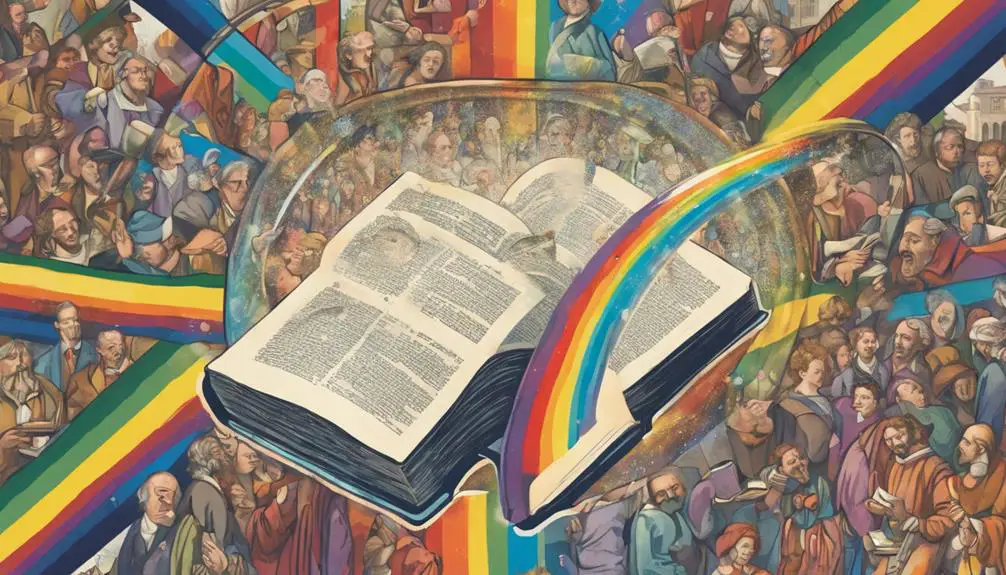Bible verses on homosexuality: are they misunderstood? Discover the intriguing nuances of translation, historical context, and cultural bias.

Are the Bible Verses About Gayness Misconstrued
Just like a prism refracts light into a rainbow of colors, so too can the Bible's verses be reflected in many different ways, with various interpretations.
You've probably heard about passages in the Bible that seem to condemn homosexuality, but is that really what they're saying? Could it be that these verses have been misunderstood or misinterpreted over the centuries?
Ponder on that thought as we peel back layers of historical context, translation nuances, and cultural biases, leaving you intrigued to further investigate this complex and controversial topic.
Key Takeaways
- Interpretation of biblical verses on homosexuality requires careful consideration of historical, cultural, and linguistic contexts.
- These interpretations have evolved historically, ranging from prohibitions to acceptance in modern times.
- Diverse contemporary theological perspectives exist, from literal condemnation to nuanced acceptance, indicating possible misconceptions.
- Reconciliation of faith and sexuality for LGBTQ+ individuals involves understanding inclusive interpretations and engaging with affirming religious communities.
Understanding Biblical Contexts

How can we fully grasp the verses in the Bible that seemingly address homosexuality without understanding their historical and cultural contexts? It's crucial that you appreciate the fact that the Bible wasn't written in our era, nor for our culture. The Old and New Testaments were composed over centuries, by numerous authors, and in diverse cultures. Therefore, understanding the intended meanings of the verses requires a deep comprehension of these contexts.
You can't ignore the language differences either. The Bible was primarily written in Hebrew, Aramaic, and Greek. A simple translation doesn't always capture the full essence of the original texts. Misinterpretations can arise when we don't consider the original language's nuances.
It's also vital to consider the audience to whom the Bible was first addressed. Biblical authors often addressed specific issues within their societies, using their writings as a form of guidance.
Examining Key Verses

So, what happens when we scrutinize the key verses that seemingly touch on homosexuality in the Bible? You'll find that the Bible has a handful of passages that are often highlighted in discussions about homosexuality, such as Leviticus 18:22 and Romans 1:26-27.
The first verse, Leviticus 18:22, says, 'You shan't lie with a man as with a woman; it's an abomination.' This verse is from the Old Testament and is often brought up in debates on homosexuality. But are we interpreting it correctly? Some scholars argue that the verse may condemn certain sexual acts, but not homosexuality as a whole.
Romans 1:26-27, on the other hand, is part of the New Testament. It refers to men and women who 'exchanged natural relations for those that are contrary to nature.' Again, is this verse condemning all homosexual acts or only certain ones? We can't really say without delving deeper into the original Greek text and the cultural context of the time.
Historical Interpretations of the Texts

Throughout history, interpretations of these texts have varied significantly, reflecting different cultural perspectives and theological viewpoints. You'll find that early Jewish interpretations, for example, typically saw the verses as a prohibition against pederasty, a common practice in the ancient world. It wasn't until later, particularly during the Middle Ages, that broader interpretations came into play, with some theologians extending the biblical prohibitions to encompass all homosexual behavior.
Moving forward, during the Reformation, focus shifted to the intent behind the action. Theologians like Martin Luther argued that it's not the action itself, but the lustful intent behind it, that constitutes sin. This perspective influenced interpretations for centuries.
In the late 19th and 20th centuries, the rise of modern psychology brought new dimensions to the interpretation of these texts. Some theologians began to consider the possibility that the verses mightn't apply to those who are innately attracted to the same sex, a viewpoint that was almost unheard of in earlier times.
As you can see, historical interpretations of these texts have been shaped by the socio-cultural milieu of their times, demonstrating the dynamic nature of theological interpretation.
Contemporary Theological Perspectives

In today's theological landscape, perspectives on the biblical verses about homosexuality have continued to evolve, reflecting a range of beliefs that span from traditional condemnation to acceptance and affirmation of LGBTQ+ identities. This diversity of viewpoints is shaped by various factors, including cultural context, personal experiences, and evolving interpretations of biblical texts.
On one end, conservative interpretations continue to uphold traditional views, arguing that passages such as Leviticus 18:22 and Romans 1:26-27 explicitly condemn homosexuality. They believe these verses should be taken literally, asserting that homosexuality is a sin and unacceptable in the eyes of God.
On the other end, progressive theologians argue for a more nuanced interpretation. They highlight the importance of understanding the historical and cultural context in which the Bible was written. For them, the verses often cited to condemn homosexuality don't necessarily carry the same implications in our current society. They advocate for an inclusive theology that affirms the dignity and worth of all individuals, regardless of sexual orientation. These divergent perspectives illustrate the complexity of theological interpretations and their profound impact on the lived experiences of LGBTQ+ individuals within religious communities.
Reconciling Faith and Sexuality

Often, individuals grappling with their sexual orientation, particularly those identifying as LGBTQ+, find themselves at the crossroads of faith and sexuality, endeavoring to reconcile their personal experiences and identities with their religious beliefs. This reconciliation journey can be challenging, yet it's an integral part of many people's search for self-acknowledgment and acceptance.
You might be one of those people who, while deeply invested in your faith, also recognize your LGBTQ+ identity. You may find it difficult to reconcile these two significant aspects of your life. However, it's essential to understand that a harmonious coexistence is possible.
Interpretations of religious texts vary greatly, and some theologians argue for a more inclusive reading of scriptures. Such interpretations focus on the broader themes of love, acceptance, and justice in religious texts, rather than specific verses that may seem to condemn homosexuality.
You don't have to abandon your faith because you identify as LGBTQ+. Instead, you can seek ways to reconcile your faith and sexuality. You might find comfort and support in LGBTQ+ affirming religious communities, theological studies that promote inclusivity, or through personal spiritual reflection. In this journey, remember to be patient with yourself, it's a personal and ongoing process.
Conclusion
In conclusion, understanding biblical views on homosexuality isn't as straightforward as it seems. It's crucial to consider the cultural and historical contexts, as well as different interpretations of key verses.
Modern theological perspectives add further complexity. While reconciling faith and sexuality may be challenging, it's not impossible. Remember, your personal relationship with your spirituality and your understanding of the Bible's teachings are what truly matter.



Sign up